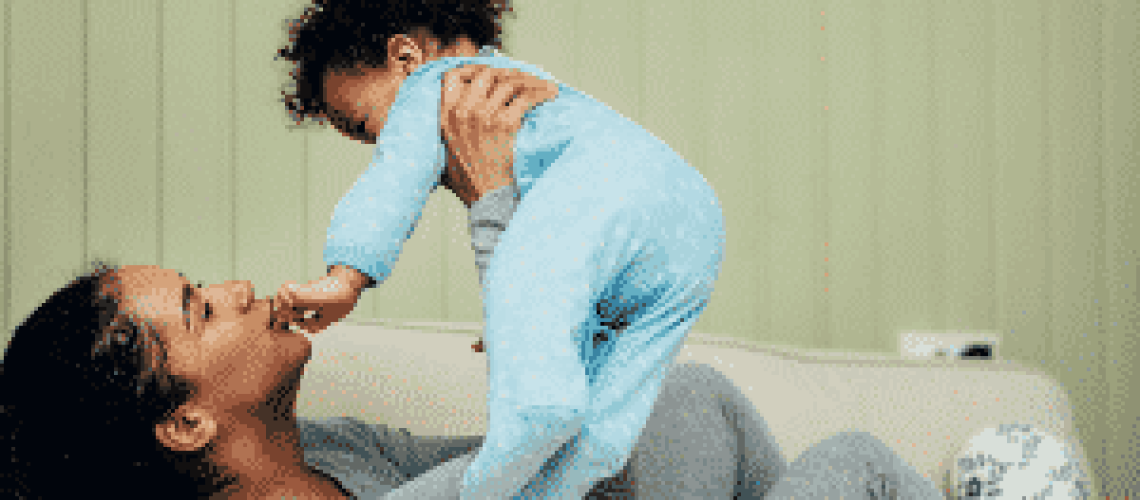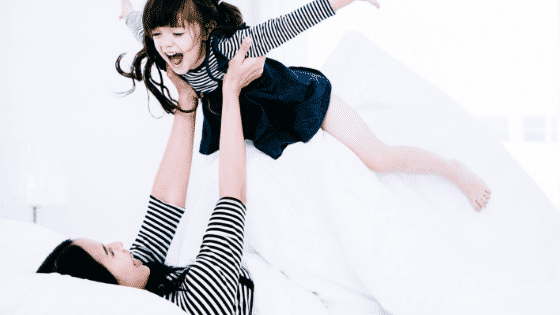
This wasn’t how I planned my morning.
I had imagined more sleep and a peaceful waking. Instead, my five year old crawled in bed with me very early and wide awake. He snuggled warmly with me for about two minutes before pestering me with rambunctiousness.
I could feel my grumps coming on. “It’s not fair! I want to sleep” I thought.
He started pawing at me and growling like an animal.
I wanted to turn right over and pull the covers over my head, but as I looked at him growling away, I thought to myself, now here is a little creature who is showing me he wants to play. He wants attention and connection.
I could have stayed grumpy and resistant. But then we’d both have been miserable.
So, instead, I stepped into my playful parent role. I acted startled, like his growls were really frightening. This gave him lots of delight. He kept growling and I whimpered and hid behind the sheets. I made baby kitten sounds: “Meow!” “Hiss!” with my tiny claws extended. He laughed hard at this.
Then I was a baby bear. “Rawrrr” I said in a small voice. He was really laughing now.
I tried all kinds of baby animals that were unsuccessful at being scary and we both cracked up.
Soon, we were ready to get up, more in-sync and both in much better moods.
Just a little bit of playful parenting had turned things around.
Why Play Helps Transform Power Battles
I became a playful parent when I discovered Playlistening, one of the Hand in Hand Parenting tools where an adult follows the child’s laughter and takes on the less powerful role. You can read more about Playlistening here.
This kind of playful parenting is a way to move toward a child who is expressing difficult behavior. You aren’t rewarding bad behavior when you do this. Instead, you are holding the belief that your child is good and offering them a way back to your good graces. Using play to set limits is like giving your kid a “get out of jail free” card. You feel the energy shift and see the twinkle return to their eyes almost instantly.
I don’t know why my son had come into my bed early that morning. Maybe he wasn’t feeling well, or had a bad dream. Usually our kids aren’t able to tell us exactly why they do what they do. I knew he needed connection and I was able to pull myself out of my sleepy funk and give it to him.
Our day started out on the right foot after all, with us both feeling connected and happy with each other.
The early morning grumpies had disappeared.
Moving Through Stuck Behavior
Our days are filled with so many activities and tasks and it can be overwhelming for the youngest members of our families. Sometimes the numerous transitions get to be too much for them and they just can’t cooperate.
Rather than delve into a frustrating and stressful power struggle use playful parenting to smooth the way.
I had a dad in one of my Starter Classes who was having a rough go of getting his little boy buckled into his car seat every day. He son’s resistance was driving him crazy. He was getting more and more angry while his child was getting more and more upset. Going places had become a real chore. At this point, both had really dug in their heels.
I asked the dad if his son liked tractors and trucks. The boy was about four years old, and the answer was yes. I asked the dad if he was willing to be a “Daddy Excavator” the next time they needed to get in the car. My instructions were to turn his arms into a scoop and make lots of clanging sound effects, then playfully and lovingly sweep his son up and into the car.
I asked if he thought his son might like it. “Yes, I think so, but he will want me to do that every time!” he complained.
Bingo!
“You’re welcome” I answered.
We had a good laugh.
Play is a really reliable way to move past these power battles. This dad had been stuck in a parenting rut that most of us have experienced. We forget that kids are playful and lock into battles with them over small situations. We get lost in wanting to win the battle and forget that it’s our job to help our kids when things get hard. Believe it or not, they’d actually rather be cooperative but that feels hard for them when they get overwhelmed.
When I told this story in class another Dad volunteered his car seat success technique. It’s called, “Get my hat.” Every time he buckles his reluctant toddler into the car, he says “Ok, get my hat!” and his son tries to grab the hat off his head while dad quickly does up the straps. He says it even works when he’s not wearing a hat! He simply invites his son to grab the invisible hat and they both laugh and pretend.
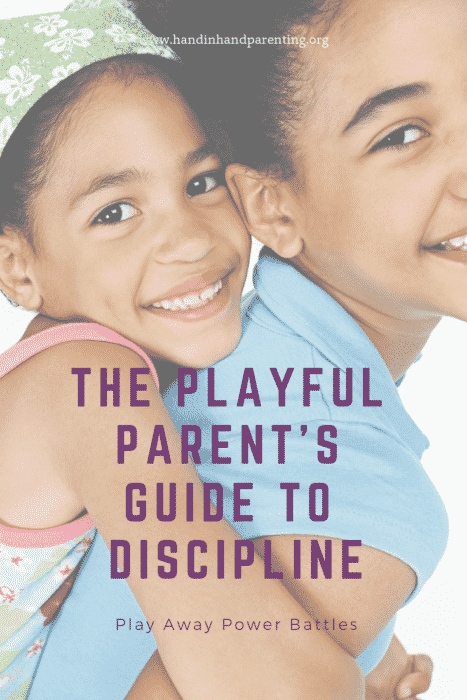
They are so busy having a good time that there are no more car seat struggles.
We can use play in lots of these kinds of interchanges, from teeth-brushing (check out the list of games in this post) to sibling battles (more games here!). The thing to watch for is that kids are really laughing – sometimes what we find funny isn’t for them. Playful parenting helps shift them from a cloudy perspective, so following their laughter is what really makes it effective.
On the morning my son woke me up early, I tried growling back at him in our play. When we were both growling I could see it didn’t delight him. In fact, my growls were a little too much and he started to look at me a bit wide-eyed. I had lost his laughter. So I returned back to being a smaller, scared animal and play resumed.
The other key to good playful parenting is tied to this – it works a million times better when you let your child lead. Sometimes they’ll speak out, “Then you do this,” or “These are the rules.” Other times, look for laughter as your guide. My son told me in his actions that he wanted to be the big growly animal, not me.
Your Kids Won’t Get Up? Here are Four Ways To Play That Will Help
Now that my son is in elementary school he doesn’t wake me as much. Actually, my latest challenge is getting him up! When he is groaning and hiding under the covers, a little playfulness goes a long way. I try to keep our time in the morning very sacred because I know we’ll be spending big chunks of the day apart. Connecting first thing helps our days begin smoothly.
I always start gently with a whispered, “Time to get up, morning’s here.”
If he needs some more encouragement, I start to get silly.
- Where is he? This is a game where I pretend I can’t find him under the covers. “Now, where is that boy? I swear I left him in here last night. Is this him? No, that’s a pillow. Is this him? No, too soft, that must be a stuffed animal! Is this him? No, this is just some random person’s leg.” I fumble around for a few moments trying to find the obvious child in the bed. It doesn’t take long to find giggles.
- What is this? Mistake body parts for different animal parts. “This couldn’t be him-no, that’s a horse’s leg. This can’t be his fuzzy head-I think it’s a raccoon’s pelt” and on and on with lots of loving contact and lots of mistakes on my part. After a few of these, my son will say, “Here I am, Mama!” and we can head toward the bathroom to get ready.
- Dance party! For older kids, or ones that need a little more oomph to get out of bed, you can have their favorite dance song on your smartphone. Start with low volume and crank it up as they start stirring. Extra points if you dance along in a ridiculous manner. Who could sleep through that?
- Rides out the door! One thing that rarely fails once I have my child roused is an offer of a piggy back ride out of the room. Sometimes he will roll out of bed onto the floor and request we do “wheelbarrow” (I hold his legs and he walks on his hands) all the way to the bathroom. We can never make it the whole distance and usually break down in a pile of giggles.
I know that mornings often feel rushed, but these antics rarely take more than a couple of minutes, and the benefits of a few giggles first thing in the morning feel a hundred percent better than the alternative.
If you have a hard time getting the energy or enthusiasm to play, read Games for Parents Who Are Too Tired To Play.
From Distraction to Connection – Rough and Tumble Play
Playful parenting can even help when you need some alone time. How? Have you ever felt like you needed to get something done and just as you got started your kids suddenly won’t leave you alone? Even worse, the more you try to ignore their distraction and get your task done quick, the more insistent they get for your attention, and the more annoyed you all get. Soon you are snapping at each other and feeling bad.
It’s true, that what your kids are doing in these moments is bidding for your attention, but not in a negative way. When their “connection cups” aren't quite full, their brains respond by seeking us out. If we have our heads buried in email or recipes or tidying or whatever it is that’s taking our focus, their brain ramps up its need to connect. The more stressed they feel, the more they aren’t able to think clearly, and that’s exactly what drives the unwanted behavior.
One way to help our kids feel connected is through rough and tumble play, which works on a physical and emotional level. Hand in Hand Parenting founder Patty Wipfler calls this the “limbic tackle” or “vigorous snuggle.” When we reach for our children warmly and playfully early as their behavior starts to go off track, we help the emotional part of their brains (the limbic system) reconnect to the rational part of their brains (the prefrontal cortex). The brain de-stresses, and their behaviour neutralizes. Those attention-seeking behaviors fade because they feel that calming sense of connection. Our love and affection literally helps build their brains!
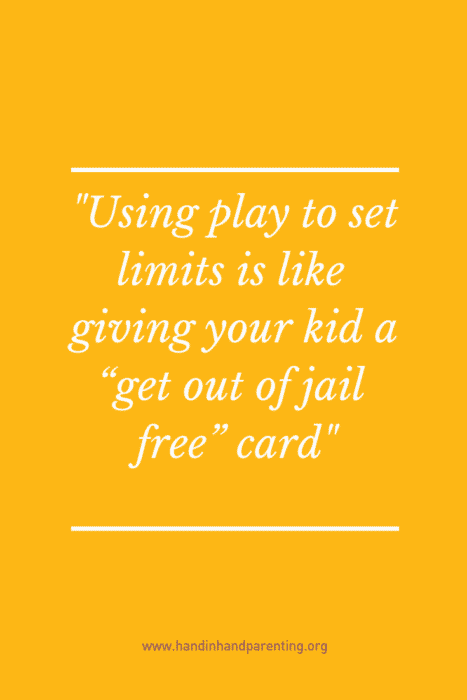
How did this look for us?
Not so long ago, I was on the sofa with my computer, trying to get some task checked off. My son was at the other end of the sofa doing lots of silly but irritating behaviors that kept me from focusing. I started to get fussy and snippy and the more I insisted on my space, the more disconnected he felt. His behaviors intensified.
Suddenly it hit me! There was no way out but “in.”
I didn’t want to end up in a fight, so I set aside my computer and announced in a playful tone, “Well if that’s how it’s going to be, I guess I will just have a seat over here.” I stood up, walked to his end of the couch and (gently) plopped myself down on his lap. I’m about twice his size, so I was careful, but still let him feel my weight and I leaned back onto him and made myself comfortable.
This was not the reaction he was expecting from me! I looked back at him with a big grin on my face and he lit up and his eyes twinkled. He gave me a big squeeze and we started to laugh and wrestle. I spent about five minutes playing rough and tumble with him, letting him get the upper hand and making sure he was laughing and having a good time.
This brief play was enough to get us reconnected. I was able to pull away from my work and show him that he was important, too. Afterward, he was able to let me take some time to finish what I was doing.
This week, when your child's behavior begins to move offtrack try stepping into your playful parent mode and watch the giggles bring you closer.
What games do you play at your house when your child doesn't want to do something?
Get 30 Games Ideas…
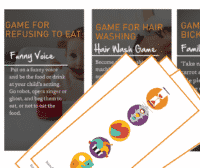
Want more game ideas? Download our Family Fun “PLAYING card” deck filled with fun ways to connect with your child.
